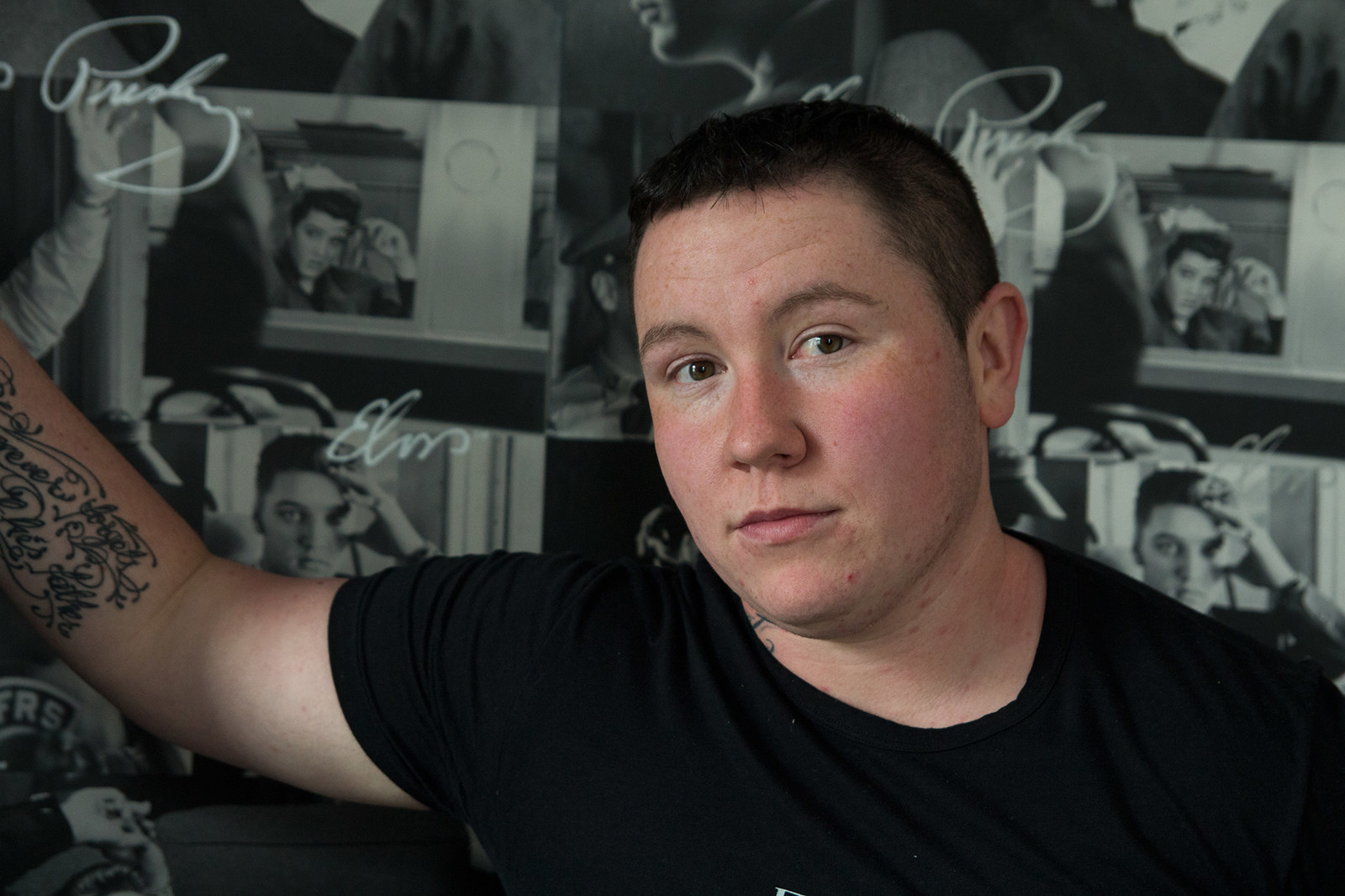
GAINSBOROUGH, England — If the 25-year-old had been born with a penis, he likely never would have been charged with sexual assault.
The events that brought him before an English judge in December 2015 began four years earlier, when he was 21 and going under the name of Joey Crislow in a Facebook profile. In the summer of 2011, he struck up a relationship online with a 23-year-old woman named Carol.
In an interview this spring, Carol recalled Joey’s profile picture showed a man who was tall and buff — “like an Australian surfer.” Joey initially said meeting in person would be difficult because he lived an hour away. But over the course of the next year, their relationship grew from chats to text messages to calls that would last until they both fell asleep. They traded “explicit” photographs, according to court records. At the time, Carol was three months pregnant and had just been dumped by her partner of four years, and Joey sent her pictures of his own daughter and said his ex wouldn’t let him see their child.
“How did I fall for somebody that I’d never met?”
Sitting at her mother’s kitchen table as her child climbed in and out of her lap, Carol described how quickly she had fallen in love. “It was the most stupidest love,” she said. “How did I fall for somebody that I’d never met?” (Carol spoke to BuzzFeed News on the condition that her last name not be used.)
Joey went to great lengths to avoid meeting. One time when they’d made a date, Carol said, she got a text from a strange number telling her Joey had had an accident and was in intensive care — but she called all the hospitals in the area and none had a patient called Joey Crislow. He avoided meeting her a few more times before she gave him an ultimatum: “You’ve got till next weekend to come down — and if you don’t come down … I’m not going to keep doing this.”
When Joey finally pulled up outside her mother’s house in October 2012, Carol realized why he’d been hiding — he looked nothing like his picture. The person behind the wheel was chubby and baby-faced, trying to conceal his features inside a puffy jacket and a floppy hat. He wouldn’t look her in the eyes when she climbed in. As he started to pull away from the curb, she jumped out in fear and ran back to her mother’s.
Carol didn’t speak to him for about two weeks after that, but eventually gave him a chance to explain. He fed her a story about creating the Joey Crislow profile as a scheme to help catch a friend’s cheating girlfriend. He told her his name was actually Kyran. He thought she wouldn’t have been interested in him if he’d shown her a real picture of himself.
It probably sounds crazy, she said, but she forgave him.
“I’d fallen for this person … That’s why, even then, I met up with them and I gave them a chance.”
Their relationship only lasted for a few more weeks but it was very intense. “Everything just came together,” Carol said of that fall of 2012. “It felt like I knew this person my whole life.” The lies were in the past, she thought, and now they “knew everything about each other.”
Kyran doted on her baby and he started sleeping over at her house almost immediately. But he was painfully shy about his body, sleeping in boxers and a tight top he said was to hide an embarrassingly large gut. They had sex just once, and both remember it as quick and awkward. Kyran kept his clothes on and pushed Carol’s hand away every time she reached for his penis.
At the time she just chalked the weirdness up to nerves: “You know when you get embarrassed the first time and you’re like, ‘Oh fuck,’ and you just roll over and you’re like, ‘I’m sorry.’”
But there were still some things Kyran hadn’t told her.
A week later, Carol’s mother caught Kyran in another lie: She spotted him working at the drive-thru window at a local McDonald’s when he had told them he worked miles away. Carol rushed to confront him and saw Kyran running out the back of the restaurant as she charged in the front.
The manager told her that the person wasn’t called Kyran, Carol remembered: “She’s Fiona Manson, and she’s a lesbian.”
As soon as Carol recovered from the shock, she went straight to the police.

Kyran told BuzzFeed News his story in May 2016, sitting on the couch in a row house off a fading commercial strip on the outskirts of Gainsborough, a town of around 20,000 in the countryside about two hours north of London.
Kyran said he met Carol just as he was fully coming to terms with being trans, and he remembered the weeks he and Carol dated as being one of the happiest times in his life so far.
Before Carol, he said, the only place he could be the man he felt himself to be was in online profiles, and their relationship was so easy precisely because she never knew he was raised as a girl. He seemed to speak forthrightly about much of what happened, though he glossed over some key details. But in his mind, one thing he never lied to Carol about was his gender.
“She was the first person I could be with in the same [physical] place and actually be myself,” Kyran said. “I was completely myself, apart from the fact that she didn’t know who I used to be.”
He was in the middle of his medical transition, having recently recovered from his second chest reduction surgery, and was looking forward to having bottom surgery. But he said that it took many years to learn that transitioning was even an option.
“I had no idea that people like me existed — the only [trans] people I ever saw on TV were men turned into women,” he said.
“I was completely myself, apart from the fact that she didn’t know who I used to be.”
Then he discovered the videos of Aydian Dowling, a trans man who became a YouTube star documenting his transition in a series of videos beginning in 2009. But once Kyran knew transitioning was possible, he said he was still afraid to take that first step — he chickened out on several doctors' appointments he booked in early 2012.
“My first thought was like, ‘How do you tell people?’... If I had got over that hurdle quicker, I would have done everything so much earlier,” he said.
Kyran said he’d planned to tell Carol after New Year's; she was so looking forward to Christmas that he didn’t want to risk upsetting her and ruin the holiday. During his sentencing hearing, the prosecutor described how Kyran came up with many excuses to avoid having sex — once claiming he’d “found a lump ... down below” — and the judge accepted Kyran’s story that he only gave in after she threatened to break things off. (Carol disputed this account in her interview with BuzzFeed News.)
In Kyran’s version of events, Carol’s mother was the one who called the police about him, omitting the fact detailed in court records that he tailed Carol from McDonald's to the police station on November 28 and was warned for harassment. Kyran described turning up at Carol’s mother’s house in January 2013 and refusing to leave when Carol wouldn’t speak to him, but he didn’t mention that he threatened to kill himself on her doorstep, according to court records, while “holding a knife as blood dripped down her [sic] arms.”
When prosecutors finally brought charges against him, he was stunned to learn that he was accused with assault by penetration — just a step removed from rape — which can carry a sentence of up to life in prison.
On June 6, 2013, Kyran pleaded guilty. He says his lawyers told him the prosecution’s case was ironclad and fighting the charge would only doom him to a stiffer sentence. And he was petrified of going to jail — he didn’t know whether he’d go to a men’s or women’s prison, and both seemed likely to leave him deeply scarred.
He pleaded guilty, but was still shocked that what he'd done was classified as sexual assault.
"It sounds like you’re going to pin someone down and do some horror to her, and it wasn’t that," Kyran said. “I’m getting done for something I didn’t even know I was doing."
British tabloids sensationalized the cases with headlines like: “Woman Duped by Lesbian with Fake Penis Reveals Her Horror.”
The British tabloids covered this case with headlines like, “Woman Duped by Lesbian with Fake Penis Reveals Her Horror” and “Mum Duped into Sex with Lesbian Using Fake Penis Vows to Get On With Her Life.” A similar case sentenced months before Kyran’s garnered equally sensational headlines, and one that came months after was summed up with phrases like, “Woman Used Rubber Penis to Pretend to Be a Man to Lure Girls Into Sex.”
There have been at least six prosecutions for so-called gender fraud in the UK since 2012, and they’ve mostly been reported as sex crimes that are so outlandish it can be easy to forget they involve real people. But they’re complicated personal stories when looked at more closely.
Most of the defendants in these cases have not identified as trans, or at least not tried to defend themselves against the charges on that basis. The courts have mostly seen these as cases of lesbians tricking women into homosexual sex. (None of the gender fraud cases have so far involved cisgender men or trans women.) But some of the other defendants appear to have been young women who seem to have been genuinely exploring their gender identity. And the prosecutions raise a fundamental question about the law of sexual consent: How far should the law go in policing what people tell each other before having sex?
Britain’s legal system is also struggling with the questions of gender identity they raise.
On Wednesday, the Court of Appeal of England and Wales ordered a new trial in the most widely covered of the recent gender fraud cases. The same day, the Court of Appeal rejected a request to reduce the prison sentence of more than three years in a separate case concerning Jennifer Staines, who pleaded guilty in March to eight charges related to three relationships she had between 2008 and 2014. The first of these relationships began when she was still a minor, and her lawyer said during sentencing that this was a time when she was also googling “transgender” and other terms that suggested she was "a confused young woman who is trying to come to terms with who she is."
How far should the law go in policing what people tell each other before having sex?
Staines was 17 when she befriended a 12-year-old girl online. They met and “snogged” after the young girl had turned 13, but they never had sex. During sentencing, the judge said three months of her total jail time was to punish this sexual touching, and there were additional counts for possessing explicit pictures that the young girl had sent to her. Staines also pleaded guilty to having sex repeatedly with another girl closer to her own age whom she dated for more than a year beginning in 2012, and a third girl who she dated for several months in 2014.
Her attorney, Stephen Mooney, told BuzzFeed News that he believed the judges were somewhat sympathetic. Though Staines now identifies as a lesbian woman, Mooney presented evidence that Staines' gender identity questions were real and that the sex grew out of emotional relationships. But in general, the courts are more concerned with the impact on the victims rather than the defendants’ situations.
“The court of appeals understood that this wasn't a girl who's a predator, who was anything other than confused,” Mooney said. But the bottom line was that the complainants “had sex with her without a full appreciation of the circumstances,” and the court put “more emphasis on the deceit than why the deceit was perpetrated.”

Carol wanted Kyran prosecuted for the fraud of creating a false persona, but fraud is only a crime in England if done for financial gain. But the fact that Kyran’s persona was male and his legal gender was female cleared the way for a sex crime charge.
As Carol put it, “I didn’t consent to having sex with a woman; I consented to having sex with a man.”
“I didn’t consent to having sex with a woman; I consented to having sex with a man.”
These crimes have become known as "gender fraud" even though they're actually prosecuted as cases of sexual assault. The basis for these charges is a little confusing because there’s no law that specifically says that it is illegal to lie about your gender to a sexual partner.
The principle grew out of a premise that no one argues with: that a person has a right to consent to sex with full knowledge of all the information that would affect their decision. The Sexual Offences Act that applies in England and Wales nods to this idea by requiring someone to “reasonably believe” a partner consents before sexual contact. (Five of these cases were prosecuted in England; a sixth was prosecuted under a different charge in Scotland, which has a separate criminal system.) If that consent is based on a lie, it follows, the consent doesn’t count.
But critics say that the courts have selectively enforced this principle, ruling out prosecutions for people who lie to a sexual partner about things including their real name, marital status, or wealth. Many legal experts contend that this reflects the bias of the largely male legal system, turning a blind eye especially to the kinds of things men routinely lie about to get women into bed.
In one recent high-profile case, prosecutors decided not to pursue charges against a group of undercover police officers who had sex with women without revealing their true identities — including two cops who fathered children with women who believed they were in an ongoing relationship.
The courts have mostly held that the only kind of lies that can nullify consent are about the nature of the sexual act, such as breaking promises not to ejaculate inside someone or to wear a condom. Misrepresenting who you are generally isn’t a crime.
The gender fraud cases have put gender identity in a very special category, and the pattern is alarming to transgender rights advocates. They create a precedent that means trans people could risk prosecution if they don’t out themselves before even light sexual contact. But disclosing their gender identity could have life-or-death consequences. There’s a long history of what’s known as “trans panic”: A number of trans women have been murdered by sexual partners who discovered they’re trans during or after sex.
It’s notable that these cases are now happening in British courts, because they come as lawmakers are deliberating reforms that would make Britain one of the easiest countries in the world to change your legal gender.
In January, a House of Commons committee issued a transgender equality report, which essentially recommends allowing people to have total control over their legal gender designation, removing requirements that transgender people must submit medical evidence to a government panel before changing their legal records.
“It’s a central part of who we are as a country that we treat people with respect, people who have the courage to think about their sexuality, to think about their gender,” Conservative MP Maria Miller, who chaired the committee, told BuzzFeed News in an interview in May 2016. (The matter is now on the back burner in the uncertainty following the UK’s decision to leave the EU.)
Miller said she was unaware of the gender fraud prosecutions, but said “there are always going to be anomalies” when changes are made “in these sorts of areas,” and that shouldn’t mean the country should be “limiting people’s rights to be able to determine who they are.”
The gender fraud cases are partly a reflection of a general shift in approach to gender identity, said Stephen Whittle, a professor of equalities law at Manchester Metropolitan University and a specialist adviser on Parliament’s transgender equality report.
“The idea that you can adopt a transgender identity is much more pervasive today — there’s not the fear that my generation had, and we have lots of young people exploring these issues for themselves,” he said.
But, he said, the courts are falling behind. He pointed out that the judges who decided the defining gender fraud case were three men in their sixties all educated at Oxford, and they are “making judgment about the lives of people on things like they’ve never experienced.”
In England and Wales these gender fraud cases have been prosecuted under a precedent set in the Court of Appeals in a 2013 ruling.
The defendant’s name was Justine McNally, a girl from Glasgow who was going by the name Scott Hill on a social networking site called Habbo in 2007. She was just 13 at the time, and befriended a girl about a year younger living in London — whom the court calls “M” — and they developed a relationship over the next three and a half years, speaking on MSN messenger and by phone.
Many of the details of the case have not been made public, but the summary of events presented in the Court of Appeal judgment makes it sound like they could have been two teenagers falling in love. They talked about getting married, having children, what they’d do together in bed.
(McNally declined to be interviewed for this story through an attorney, but directed BuzzFeed News to refer to her with female pronouns.)
M alleged they had sex just once, the first time McNally visited her in London in March 2011, when McNally was 17 and M was 16. (Sixteen is the age of consent in England.) But their relationship carried on for several visits, during which “there were lots of occasions of oral penetration and occasions of digital penetration,” the court wrote. “They wanted to engage in sexual activity all the time.”
On McNally’s fourth and final visit, M’s mother found a bra and a strap-on in McNally’s bag, a discovery M testified made her feel “physically sick.” McNally confessed everything to the two when confronted — and showed them her Facebook page under her given name that pictured her wearing a pink dress and heels. She “kept talking about wanting a sex change” and begged to keep the relationship alive, according to the court.
It’s not clear what M wanted at this point, but M’s mother called McNally’s school to complain, and the school reported the sexual contact to police.
The appeals ruling suggests McNally never told police, her lawyers, or a judge that she wanted to undergo medical transition. She initially intended to fight the charges by claiming that M had known about her gender for about two years before they met in person. But in a turn that appeared to mystify her defense attorney, she withdrew the claim and decided to plead guilty to almost all the charges against her.
In March 2013, when McNally was 19, a judge sentenced her to three years in prison for six counts of assault by penetration using her fingers and tongue. In a deal with prosecutors, a seventh charge for penetrating M with a dildo was dropped — McNally maintained throughout the proceedings that this never happened.
McNally appealed her sentence, and her new lawyers hoped they could get the Court of Appeal to throw out her conviction altogether in part by arguing that the conviction got the law wrong: A lie about gender shouldn’t invalidate sexual consent.
There were only two relevant cases in which the courts had ruled consent could be invalidated by a lie, they said; both concerned violating an agreement about the sex act, not a misrepresentation of identity. One concerned WikiLeaks founder Julian Assange, in which the court decided that it could be a crime to break a promise to wear a condom; the second involved a man accused of breaking a promise to pull out before ejaculating. In essence, McNally’s lawyers argued, a lie about gender was more like lying about your wealth than lying about exposure to semen.
The three-judge panel agreed to reduce her time in prison, but rejected that she had committed no crime, saying her attorneys’ argument defied “common sense.”
“Thus while in a physical sense, the acts of assault by penetration of the vagina are the same whether perpetrated by a male or a female, the sexual nature of the acts is, on any common sense view, different where the complainant is deliberately deceived by a defendant into believing that the latter is a male,” wrote Lord Justice Brian Leveson for the three-judge panel.
“Some deceptions (such as, for example, in relation to wealth) will obviously” not be the kind of lie that would invalidate consent, Leveson wrote. But gender could be fundamental to consent, Leveson continued: “M chose to have sexual encounters with a boy and her preference (her freedom to choose whether or not to have a sexual encounter with a girl) was removed” by McNally’s misrepresentation.
The Crown Prosecution Service — the agency that oversees all prosecutions in England and Wales — issued guidelines following this judgment urging prosecutors to consider factors including whether the offense “occurred as a result of the suspects [sic] uncertainty or ambivalence about his/her gender identity” and what steps a defendant “has taken to acquire a new gender status.” CPS senior legal adviser Neil Moore told BuzzFeed News in an interview that trans people were not being “targeted” for prosecutions.
But the McNally precedent creates tremendous uncertainty for transgender people, said Tom Wainwright, who represented McNally during her appeal. The ruling says “there’s no consent in some circumstances,” if someone is judged to have misrepresented their gender, “but we don’t know what those circumstances are.”
Because “sexual assault” encompasses a wide range of acts, the courts may have opened the door to gender deception prosecutions for sexual contact far short of penetration.
“That has huge implications for the trans community,” Wainwright said. “That definition of consent applies not just to sex; it [also] applies to sexual assault — which can include a kiss.”
It creates serious problems for the court to get involved in personal relationships on this level, Wainwright said. "My view generally on these things is, 'buyer beware.'"

By the time the sentence was handed down in December 2015, the person who had been charged as Fiona Manson was officially known as Kyran Lee.
Sentencing was delayed for 18 months because another woman came forward after Carol’s accusation made the news, saying Kyran had similarly deceived her. Kyran fought the charges and won, his lawyer said, because there was insufficient evidence he and the other woman had ever had sex.
During those 18 months, Kyran had begun to medically transition. He said he first requested hormone therapy from his doctor around July 2012, but it took until 2014 to complete the psychiatric and medical reviews required by the National Health Service to start hormone therapy. He had his first chest reduction surgery shortly before being sentenced.
You don’t get a handbook what you can and can’t do as a trans man.
The evidence of transition that Kyran presented to the court helped keep him out of jail. Judge Michael Heath said he would commute Kyran’s two-year prison sentence so he wouldn’t go to prison unless he commits a serious violation of his probation. The judge said he was lenient because he was convinced that Kyran wanted to “have a relationship as a man with a woman ... it was not a [ruse] to practise lesbian behaviour.”
Kyran is, however, now a registered sex offender. But when he spoke to BuzzFeed News in May his life had seemed to be getting back on track, including recently getting engaged to be married. And he still thinks it's unfair that if he’d been raised a boy and done the same thing — created a fake male persona and had sex with a woman — he likely wouldn’t have been prosecuted.
"You don’t get a handbook what you can and can’t do [as a trans man],” he said.
Carol also feels let down by the justice system. She was shattered when Kyran escaped jail, and now suffers anxiety so severe that she generally won’t leave the house alone. She questions nearly everything Kyran told the court, and now she lives a few blocks from the person she feels raped her.
Kyran “violated me, as far as I’m concerned,” Carol said. “People should be who they want to be, and nobody should have a right to tell them who they are … [but] I think what that person had done was completely in the wrong.”

